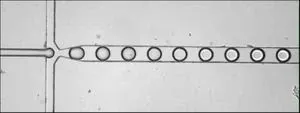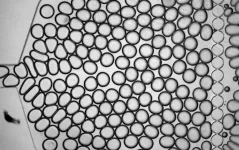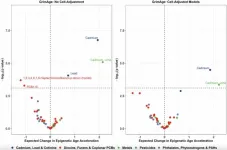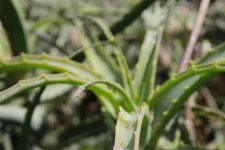(Press-News.org)
Bigger, tastier tomatoes and eggplants could soon grace our dinner plates thanks to Johns Hopkins scientists who have discovered genes that control how large the fruits will grow.
The research—led by teams at Johns Hopkins University and Cold Spring Harbor Laboratory—could lead to the development of new varieties of heirloom tomatoes and eggplants, including those that help support agriculture in areas around the world where local varieties are currently too small for large-scale production.
Findings were published in the journal Nature.
“Once you’ve done the gene editing, all it takes is one seed to start a revolution,” said co-lead author Michael Schatz, a geneticist at Johns Hopkins University who worked on the Telomere-to-Telomere human genome project. “With the right approvals, we could mail an engineered seed to Africa or anywhere it’s needed and open up entirely new agricultural markets. There’s huge potential to translate these advances into real-world impact.”
The research is part of a larger effort to map the complete genomes of 22 crops in the nightshade genus, which includes tomatoes, potatoes, and eggplants.
Using computational analysis, the researchers compared the genome maps and traced how the genes evolved over time: more than half, the researchers found, had been duplicated at some point in the past.
“Over tens of millions of years, there’s this constant churn of DNA sequences being added and lost,” Schatz said. “The same process can occur for gene sequences, where entire genes duplicate or disappear. When we started looking, we noticed these changes were very widespread, but we didn’t yet know what those changes meant for the plants.”
To find out, collaborators at the Boyce Thomson Institute used CRISPR-Cas9 gene-editing technology to tweak one or both duplicates of a gene, and collaborators at Cold Spring Harbor grew the engineered plants to see how the tweaks changed the mature plants.
The genetic duplicates, or paralogs, ended up being important for determining traits like flowering time, fruit size, and fruit shapes. Turning off both copies of the CLV3 gene paralogs in the forest nightshade native to Australia, for example, resulted in plants that the researchers described as “weird, bubbly, disorganized” shapes—not viable to sell as produce in grocery stores. But careful editing of just one copy of CLV3 led to larger fruits.
“Having full genome sequences for these species is like having a new treasure map. We can see where and when one genetic path diverges from another and then explore that place in the genetic information where we wouldn’t have thought to look,” said Katharine Jenike, who assembled the genome sequences and was a PhD student in Schatz’s lab at the time of the research. “They allowed us to find the size-genes in a really unexpected place.”
In the African eggplant, a species grown across the African continent and in Brazil for its edible fruits and leaves, the researchers identified a gene, SaetSCPL25-like, that controls the number of seed cavities, or locules, inside the fruit. When they edited the SaetSCPL25-like genes in the tomato plant, the researchers found they could grow tomatoes with more locules: the more numerous the locules, the bigger the tomato.
The discovery could usher in a new era of tasty tomatoes, if done properly, the researchers said.
“This work shows the importance of studying many species together,” Schatz said. “We leveraged decades of work in tomato genetics to rapidly advance African eggplants, and along the way we found entirely new genes in African eggplants that reciprocally advance tomatoes. We call this ‘pan-genetics,’ and it opens endless opportunities to bring many new fruits, foods, and flavors to dinner plates around the world.”
END
About The Study: The combination of coronary artery calcium (CAC) score with a primary prevention strategy in intermediate-risk patients with a family history of coronary artery disease was associated with reduction of atherogenic lipids and slower plaque progression compared with usual care. These data support the use of CAC score to assist intensive preventive strategies in intermediate-risk patients.
Corresponding Author: To contact the corresponding author, Thomas H. Marwick, MBBS, PhD, MPH, email Tom.Marwick@bakeridi.edu.au.
To ...
About The Study: In 2023, reported breast and colorectal cancer screening rebounded from COVID-19 pandemic–related declines and surpassed pre-pandemic estimates. These findings are encouraging given larger-than-expected declines in early-stage breast and colorectal cancer diagnoses in 2020 and increases in distant-stage breast cancer diagnoses through 2021. Cervical cancer screening rates remained below pre-pandemic levels, a troubling trend as early-stage diagnoses continued to decrease in 2021. The persistent decline may in part reflect longer-term declines in patient knowledge and clinician recommendation of cervical cancer ...
About The Study: In this cohort study of middle-aged and older participants, persistent inadequate sleep duration and late sleep onset, whether alone or in combination, were associated with greater glycemic variability. These findings emphasize the importance of considering both sleep duration and timing for optimizing glycemic control in the general population.
Corresponding Authors: To contact the corresponding authors, email Ju-Sheng Zheng, PhD, (zhengjusheng@westlake.edu.cn) and Yu-ming Chen, PhD, (chenyum@mail.sysu.edu.cn).
To access the embargoed study: Visit our For The Media website at this link ...
About The Study: This study found that over time, the trajectory of sports gambling frequency was associated with the trajectory of alcohol-related problems. Screening and treatment interventions are recommended for sport gamblers who also drink concurrently, especially because this group appears to be at an elevated risk for developing greater alcohol-related problems over time.
Corresponding Author: To contact the corresponding author, Joshua B. Grubbs, PhD, email joshuagrubbs12@unm.edu
To access the embargoed study: Visit our For The Media website at this link https://media.jamanetwork.com/
(10.1001/jamapsychiatry.2025.0024)
Editor’s Note: Please ...
Combine a garden-variety green laser, microwaves with roughly the energy of your wi-fi, and some diamond dust in drops of water, and what do you get? A precise chemical detection tool.
For the first time, researchers have combined nanodiamonds in microdroplets of liquid for quantum sensing. The new technique is precise, fast, sensitive, and requires only small amounts of the material to be studied – helpful when studying trace chemicals or individual cells. The results were published in the journal Science Advances in December.
“We weren’t even sure ...
“Environmental chemical exposures represent a key modifiable risk factor impacting human health and longevity, and our findings provide evidence for associations between several environmental exposures and epigenetic aging in a large sample representative of the US adult population.”
BUFFALO, NY — March 5, 2025 — A new research paper was published in Aging (Aging-US) on February 11, 2025, Volume 17, Issue 2, titled “Exposome-wide association study of environmental chemical exposures ...
Jerome E. Morris, the E. Desmond Lee Endowed Professor of Urban Education at the University of Missouri–St. Louis, has been voted president-elect of the American Educational Research Association (AERA). Morris joins the AERA Council in 2025–2026 as president-elect, and his presidency begins at the conclusion of the association’s 2026 Annual Meeting.
Morris leverages his upbringing in public housing and attending predominantly Black public schools in Birmingham, Alabama, to inform his research, which examines the intersection of ...
WASHINGTON — Agave plants may be best known for their role in tequila production, but they are also remarkably adept at retaining water in extremely dry environments. In a new study, researchers used terahertz spectroscopy and imaging to gain new insights into how these succulents store and manage water to survive in dry conditions.
“Understanding how plants adapt to dry conditions could lead to better farming practices and be used to develop crops that require less water,” said Monica Ortiz-Martinez ...
The Aligning Science Across Parkinson’s (ASAP) initiative opened applications for research community members to apply for funding to develop novel tools to advance Parkinson’s disease (PD) research. The Collaborative Research Network (CRN) 2025 Technical Track grants will support the development of sustainable tools to accelerate validation and therapeutic research and discovery for emerging targets identified through ASAP discoveries, offering funding of up to $2M per year over three years, up to $6M total.
"By bringing researchers together to generate new preclinical tools for targets studied in our ASAP programs, our goal ...
ORLANDO, Fla. – Mar. 5 2025 – New research has uncovered a potential gamechanger for improving cardiometabolic health: fresh mangos. A study recently published in the journal Nutrients finds that eating two cups of mango, just about 100 calories-worth, daily may help lower insulin concentration levels and improve insulin sensitivity in adults who are overweight or obese with chronic low-grade inflammation. The findings underscore how simple dietary choices could contribute to reducing the risk of chronic conditions like type 2 diabetes, ...






